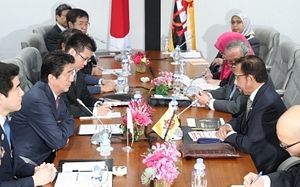Over the weekend, Japan’s Foreign Minister Taro Kono was on a brief visit to Brunei, which was his first such trip in five years. His visit, which came following a cabinet reshuffle in the Southeast Asian state, reinforced the importance of the relationship and provided some indications as to what we might expect for bilateral ties for the rest of the year in the context of broader changes underway in the region.
As I have noted before, the Japan-Brunei relationship is significant not only from an economic perspective – Japan is the dominant market for Brunei’s liquified natural gas (LNG) and its first bilateral free trade agreement (FTA) partner – but also strategically as well especially in the context of Japan’s deepening engagement with Southeast Asia and oil-rich Brunei’s longstanding quest for economic diversification amid reform.
The efforts to strengthen bilateral ties have continued into 2018 amid some broader domestic and regional changes. For instance, following a cabinet reshuffle in Brunei in late January ahead of the annual parliamentary session in March, we saw a visit from Japan’s Vice Minister for Defense Ro Manabe in early February where both countries discussed advancing defense ties and the Japan Maritime Self-Defense Force (JMSDF) carried out a range of activities, including a seminar and exercise focused on humanitarian assistance and disaster relief and search and rescue (See: “Naval Visit Puts Japan-Brunei Defense Ties in the Headlines”).
This week, we saw another significant development on this front tied to Japanese Foreign Minister Taro Kono’s visit to Brunei, which was his first visit there in five years. Kono’s visit was part of a quick two-country Southeast Asia trip from February 10 to February 12 that also covered Singapore. The trip also coincided with the visit of three JMSDF overseas training cruise ships at Brunei’s Muara Port for a goodwill visit that further reinforced the importance of the defense component of ties.
Kono’s visit saw him meet Brunei’s second minister of foreign affairs and trade and second minister of defense, who had both just been appointed on January 30 following the reshuffle (Kono himself had assumed the foreign minister post following a reshuffle of Abe’s cabinet last August). During the consultations, the two sides discussed a range of issues in bilateral ties that they are looking to advance in 2018 – including economic cooperation, expanding defense exchanges, and resuming direct flights between Japan and Brunei for the first time in two decades – and agreed on the need for early signing of a technical cooperation agreement under negotiation.
They also discussed regional issues in the Asia-Pacific and beyond. This included the ongoing pressure campaign underway against North Korea as well as regional trade, with the two countries being part of the original Trans-Pacific Partnership (TPP) now moving forward as the Comprehensive and Progressive Agreement for the Trans-Pacific Partnership (CPTPP) with U.S. withdrawal (See: “What Trump’s TPP Withdrawal Means for US Asia Policy”).
There was also discussion about the Free and Open Indo-Pacific Strategy Japan is continuing to promote in 2018, as I noted in a separate piece (See: “ASEAN’s role in Japan’s Indo-Pacific Strategy”). Kono explained the importance of Brunei and Southeast Asian states within this strategy during his consultations with Brunei officials. But he also touched on the strategy separately in remarks given on board the Japanese escort vessel DD Yamagiri during his visit to Muara Commercial Port. In that address, he reinforced the importance of the JMSDF in promoting freedom in the maritime domain, the significance of which was not missed given that Brunei is a claimant, albeit a quiet one, in the South China Sea disputes.
































